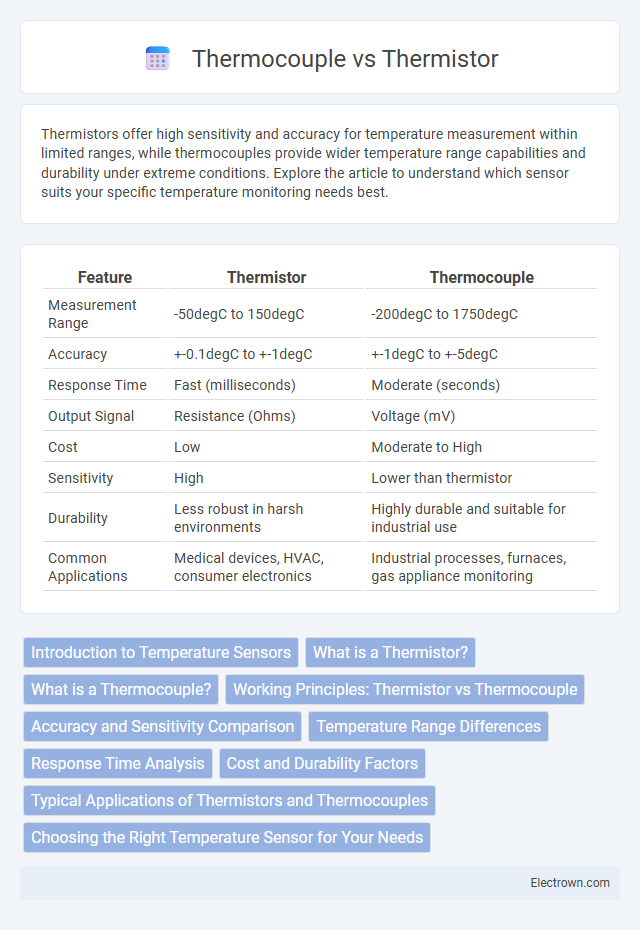Thermistors offer high sensitivity and accuracy for temperature measurement within limited ranges, while thermocouples provide wider temperature range capabilities and durability under extreme conditions. Explore the article to understand which sensor suits your specific temperature monitoring needs best.
Table of Comparison
| Feature | Thermistor | Thermocouple |
|---|---|---|
| Measurement Range | -50degC to 150degC | -200degC to 1750degC |
| Accuracy | +-0.1degC to +-1degC | +-1degC to +-5degC |
| Response Time | Fast (milliseconds) | Moderate (seconds) |
| Output Signal | Resistance (Ohms) | Voltage (mV) |
| Cost | Low | Moderate to High |
| Sensitivity | High | Lower than thermistor |
| Durability | Less robust in harsh environments | Highly durable and suitable for industrial use |
| Common Applications | Medical devices, HVAC, consumer electronics | Industrial processes, furnaces, gas appliance monitoring |
Introduction to Temperature Sensors
Temperature sensors like thermistors and thermocouples are essential for accurate temperature measurement in various applications, from industrial processes to consumer electronics. Thermistors are semiconductor devices that change resistance with temperature and offer high sensitivity within a limited temperature range, making them ideal for precise temperature control. Thermocouples consist of two dissimilar metals generating a voltage proportional to temperature, suitable for wide temperature ranges and harsh environments, helping you select the best sensor for your specific needs.
What is a Thermistor?
A thermistor is a temperature-sensitive resistor made from semiconductor materials that exhibit a significant change in resistance with temperature variation, commonly used for precise temperature measurements within a limited range. These devices are categorized into Negative Temperature Coefficient (NTC) and Positive Temperature Coefficient (PTC) types, where resistance decreases or increases as temperature rises, respectively. Thermistors offer high sensitivity, rapid response, and are widely applied in medical devices, automotive sensors, and environmental monitoring systems.
What is a Thermocouple?
A thermocouple is a temperature sensor consisting of two dissimilar metal wires joined at one end, which produces a voltage proportional to temperature differences between the joined end and the reference end. This voltage signal allows precise temperature measurements in a wide range of environments, from industrial processes to scientific research. Understanding the advantages of a thermocouple, such as its durability and wide temperature range, can help you select the best sensor for your specific application.
Working Principles: Thermistor vs Thermocouple
Thermistors operate based on the resistance change of semiconductor materials with temperature variations, providing high sensitivity and accuracy in narrow temperature ranges. Thermocouples generate a voltage from the temperature difference between two dissimilar metal junctions, enabling wide temperature measurement capabilities. Understanding the working principles helps you select the right sensor for precise temperature monitoring in your specific application.
Accuracy and Sensitivity Comparison
Thermistors offer higher accuracy and sensitivity in measuring temperature changes, with typical accuracy ranging from +-0.1degC to +-0.2degC, making them ideal for precise temperature control applications. Thermocouples, while less accurate with typical errors around +-1degC to +-5degC, excel in measuring extremely high temperatures and rapid temperature fluctuations due to their wide temperature range and fast response time. Your choice depends on whether you prioritize the fine accuracy and sensitivity of thermistors or the broad measurement range and robustness of thermocouples.
Temperature Range Differences
Thermistors typically operate within a narrower temperature range of -55degC to 150degC, offering high sensitivity and accuracy in this domain. Thermocouples can measure much broader temperature ranges, from approximately -200degC up to 2500degC depending on the type (e.g., Type K or Type J). This makes thermocouples more suitable for extreme temperature environments, while thermistors excel in lower temperature precision applications.
Response Time Analysis
Thermistors offer faster response times, typically ranging from milliseconds to a few seconds, due to their small size and high sensitivity to temperature changes. Thermocouples exhibit slightly slower response times, usually in the order of seconds, as they rely on the thermoelectric effect generated at the junction of two metals. Your choice between a thermistor or thermocouple should consider the required speed of temperature measurement for precise and timely data acquisition.
Cost and Durability Factors
Thermistors generally offer a lower initial cost compared to thermocouples, making them a cost-effective choice for applications with tight budget constraints. Thermocouples tend to have greater durability and can withstand higher temperatures and harsh environments, providing long-term reliability in industrial settings. Despite the higher upfront investment, thermocouples often reduce maintenance costs due to their robust construction and extended operational lifespan.
Typical Applications of Thermistors and Thermocouples
Thermistors are commonly used in temperature sensing applications requiring high sensitivity and precision, such as medical devices, household appliances, and automotive temperature control systems. Thermocouples excel in industrial environments with wide temperature ranges and harsh conditions, including furnace monitoring, gas turbine exhaust measurement, and engine performance testing. Your choice between thermistor and thermocouple depends on the specific temperature range, accuracy, and environmental factors of your application.
Choosing the Right Temperature Sensor for Your Needs
Selecting the right temperature sensor depends on accuracy requirements, operating temperature range, and environmental conditions. Thermistors offer high precision and sensitivity in a narrow temperature range, typically from -55degC to 150degC, making them ideal for medical and HVAC applications. Thermocouples, capable of measuring extreme temperatures up to 2300degC, are preferred in industrial and high-temperature processes due to their durability and wide temperature range.
Thermistor vs Thermocouple Infographic

 electrown.com
electrown.com